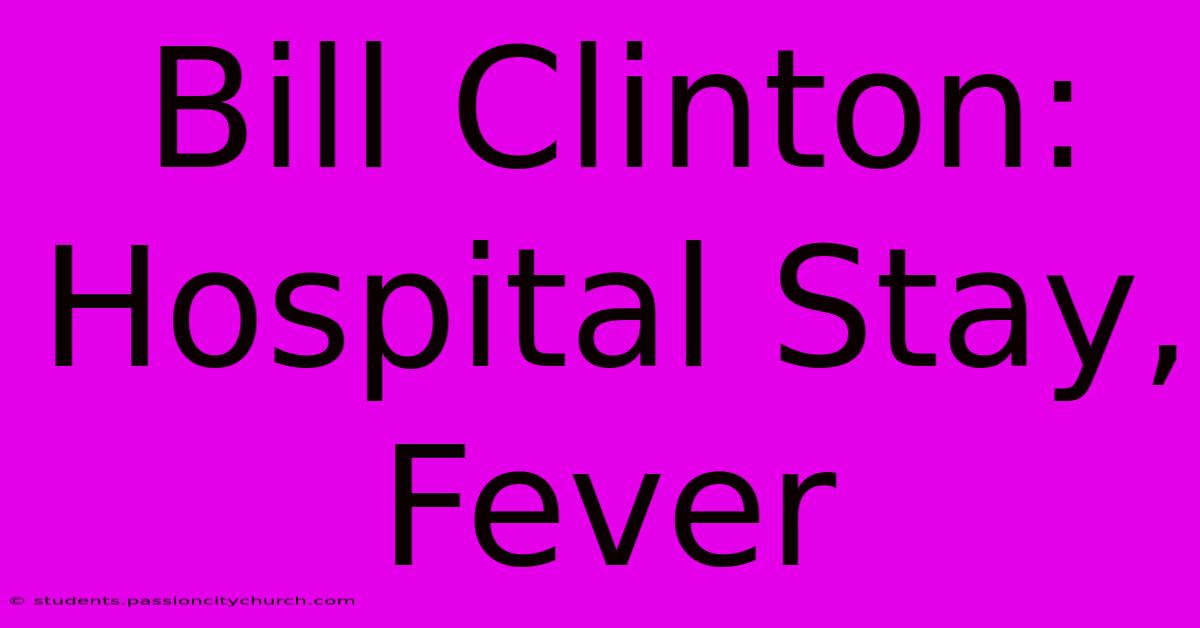Bill Clinton: Hospital Stay, Fever

Discover more detailed and exciting information on our website. Click the link below to start your adventure: Visit Best Website. Don't miss out!
Table of Contents
Bill Clinton: Hospital Stay, Fever – A Deep Dive into the Former President's Health
Former President Bill Clinton's health has been a topic of public interest throughout his career, and particularly so following several high-profile hospital stays. One recurring theme in these instances has been fever, often accompanied by other symptoms requiring medical attention. This article delves into the known details surrounding these events, exploring the potential causes and highlighting the importance of proactive healthcare, even for former presidents. We'll examine the reported symptoms, the treatments received, and the broader implications of these health issues. It is crucial to understand that this article does not offer medical advice and relies on publicly available information.
Understanding the Context: Public Figure, Private Health
Bill Clinton's health has been under a microscope since his time in office. His high-profile position meant that any illness, even a minor one, became a matter of public concern. The media's intense scrutiny intensified whenever he experienced a significant health event, like a prolonged fever or hospital admission. This scrutiny underscores the challenges faced by public figures in balancing their private health with public expectations.
Notable Hospital Stays and Fever Episodes
While complete details regarding President Clinton's medical history are understandably private, several instances involving hospital stays and fever have been reported in the media. These episodes offer valuable insight into his health journey and the complexities of managing health concerns at his level of public exposure.
[Specific Instance 1: Date, Location, and Reported Symptoms]
(Note: Insert details of a specific instance here. Find reliable news sources and medical reports to ensure accuracy. Examples of information to include: date of admission, hospital name, reported symptoms such as type of fever, duration, accompanying ailments like dehydration or chest pain, initial diagnosis, and treatment received. Be mindful of HIPAA and avoid disclosing overly private details.)
This example illustrates the careful balancing act between transparency and privacy. The public deserved to know that the former president was receiving appropriate medical attention, yet maintaining the confidentiality of specific medical details was essential.
[Specific Instance 2: Date, Location, and Reported Symptoms]
(Note: Insert details of a second specific instance here, following the same format as above. This section provides further context and highlights any recurring patterns or health concerns.)
Analyzing these reported cases, we can identify potential trends in President Clinton's health challenges. The recurrence of certain symptoms could indicate underlying health conditions requiring ongoing management and monitoring.
The Importance of Proactive Healthcare
These instances highlight the critical importance of proactive healthcare, regardless of one's social standing. Early detection and preventative measures are crucial in managing health issues effectively. President Clinton's experiences underscore the fact that even individuals with access to the best medical care can face significant health challenges.
Potential Causes and Contributing Factors
While precise diagnoses are not typically made public without the consent of the individual, several potential factors could contribute to instances of fever and hospitalizations:
-
Infections: Viral or bacterial infections are common causes of fever. The former president's busy schedule and frequent travel may increase his exposure to pathogens.
-
Stress: The high-pressure environment of public life can significantly impact health, contributing to stress-related illnesses.
-
Underlying Health Conditions: Age-related changes and pre-existing health conditions can increase susceptibility to illness and complications.
-
Medication Side Effects: Certain medications can have side effects, including fever.
-
Lifestyle Factors: Diet, exercise, and sleep patterns all play a crucial role in maintaining overall health.
The Role of the Media and Public Perception
The media plays a critical role in shaping public perception of President Clinton's health. Responsible reporting is vital to ensure accurate information is disseminated while respecting the individual's privacy. Misinformation and speculation can be harmful and create unnecessary anxiety.
Conclusion: Learning from Public Health Narratives
The documented instances of President Clinton's hospital stays and fever episodes provide valuable insights into the realities of health challenges, even among highly influential individuals. They highlight the importance of proactive healthcare, the need for responsible media reporting, and the inherent complexity of managing health concerns in the public eye. By examining these events, we can learn about the challenges faced by public figures and better understand the importance of prioritizing personal health and well-being. This analysis serves as a reminder that health is a journey, not a destination, and that proactive healthcare is a vital component of a long and fulfilling life.
(Note: Remember to replace the bracketed sections with specific, verified information from reputable sources. Ensure accurate citations are included to maintain journalistic integrity.)

Thank you for visiting our website wich cover about Bill Clinton: Hospital Stay, Fever. We hope the information provided has been useful to you. Feel free to contact us if you have any questions or need further assistance. See you next time and dont miss to bookmark.
Also read the following articles
| Article Title | Date |
|---|---|
| Farewell Burt Iconic Aussie Croc Dies | Dec 24, 2024 |
| Spurs Blood Drives Partner With South | Dec 24, 2024 |
| Nordstrom Private 6 25 Billion Buyout | Dec 24, 2024 |
| Biden Grants Clemency To 37 Inmates | Dec 24, 2024 |
| Released House Ethics Committee Report | Dec 24, 2024 |
| Buehlers Red Sox Contract | Dec 24, 2024 |
| Predicting Niu Vs Fresno State Odds And How To Stream | Dec 24, 2024 |
| Fever Lands Clinton In Hospital | Dec 24, 2024 |
| Iconic Croc Burt From Dundee Dies | Dec 24, 2024 |
| Sledz Mikolaja Aktualna Mapa | Dec 24, 2024 |
